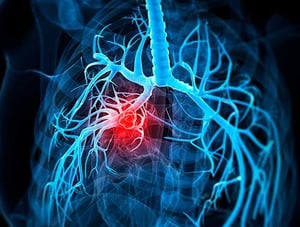Personalized Online Training in Lung Cancer Management in Times of Crisis and Beyond
 This CME-eligible program consists of a series of five interactive webinars designed to address gaps in knowledge and practice related to the screening, diagnosis, staging, and treatment of patients with localized and advanced non-small cell lung cancer (NSCLC) during and beyond a viral pandemic. The key points from the webinars will be summarized in two follow-up podcasts. Participants will also test their knowledge immediately and several months after the event by answering quizzes delivered digitally via a web-based platform.
This CME-eligible program consists of a series of five interactive webinars designed to address gaps in knowledge and practice related to the screening, diagnosis, staging, and treatment of patients with localized and advanced non-small cell lung cancer (NSCLC) during and beyond a viral pandemic. The key points from the webinars will be summarized in two follow-up podcasts. Participants will also test their knowledge immediately and several months after the event by answering quizzes delivered digitally via a web-based platform.
Expert interdisciplinary and crossdisciplinary faculty representing thoracic surgery, radiation, medical oncology, pathology, advanced nursing practice, and interventional pulmonology will share their knowledge, review guidelines and landmark papers, and answer questions during these interactive webinars.
Now available on demand
Lung Cancer Screening and Treatment of Early Stage
Expert faculty comprised of a pulmonologist, advanced nurse practitioner, thoracic surgeon, and radiation oncologist will discuss current guidelines and their own experiences with lung cancer screening and management of early-stage lung cancer.
Moderators: Eric Edell, MD, FCCP, and Septimiu Murgu, MD, FCCP
Panelists: Kimberly Sivertsen, APRN-BC; Nichole Tanner, MD, MS, FCCP; Janani Reisenauer, MD; and Andreas Rimner, MD

Bronchoscopy, EBUS-TBNA, and CT-Guided Biopsy
Two internationally known interventional pulmonologists will discuss current guidelines and their own experiences regarding sampling of lung lesions and mediastinal adenopathy. Specifically, the panelists will discuss the pros and cons of various diagnostic strategies and sampling techniques, including transcutaneous and bronchoscopic biopsies.
Moderators: Eric Edell, MD, FCCP, and Septimiu Murgu, MD, FCCP
Panelists: Nichole Tanner, MD, MS, FCCP, and Fabien Maldonado, MD, FCCP

Optimal Tissue Acquisition, Handling, and Processing NGS and PD-L1 Testing
Expert pathologists and a medical oncologist will discuss current guidelines and their own practices regarding the role of liquid biopsy and comprehensive genetic and PD-L1 testing in the management of advanced lung cancer. The panelists will discuss the various strategies for optimizing the quantity and quality of cytology and small volume biopsy specimens.
Moderators: Septimiu Murgu, MD, FCCP, and Eric Edell, MD, FCCP
Panelists: Jeffrey Mueller, DO; Christopher Hartley, MD; and Narjust Duma, MD

Updates on Clinical Trials in Oncology and Radiation
Two internationally known medical and radiation oncologists will discuss ongoing and recent clinical trials and offer their perspectives on how they will impact thoracic oncology practice. The panelists will also discuss current guidelines for managing patients with advanced lung cancer and emphasize the role of tissue and blood biomarkers.
Moderators: Septimiu Murgu, MD, FCCP, and Eric Edell, MD, FCCP
Panelists: Narjust Duma, MD, and Andreas Rimner, MD

Strategies for Optimizing Timeliness of Diagnosis and Treatment of Patients With Lung Cancer During Global Crises
A multidisciplinary panel including a medical oncologist, a thoracic surgeon, and an interventional pulmonologist will discuss the role of lung cancer teams in their thoracic oncology practices. The panelists will review their management of patients with lung cancer during the pandemic, including the impact of delayed procedures and telemedicine on patient outcomes.
Moderators: Septimiu Murgu, MD, FCCP, and Eric Edell, MD, FCCP
Panelists: Narjust Duma, MD; Janani Reisenauer, MD; and Colleen Channick, MD, FCCP

Program made possible in part by an independent educational grant from AstraZeneca Pharmaceuticals, an educational grant from Genentech, a member of the Roche Group, and an independent medical education grant from Merck Sharp & Dohme Corp.